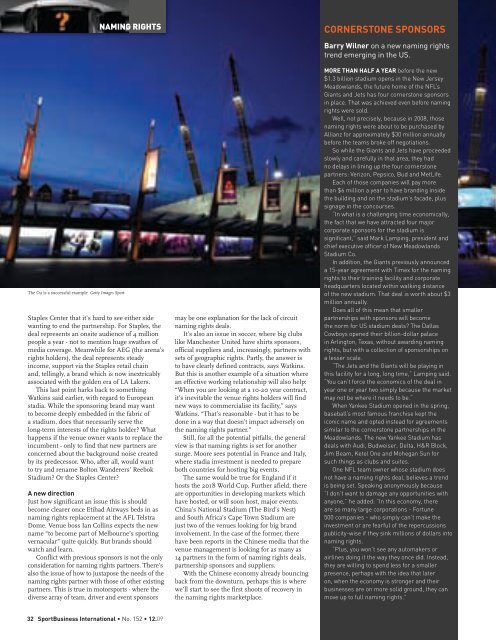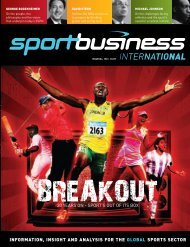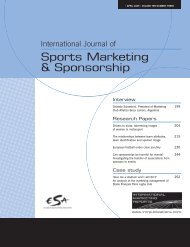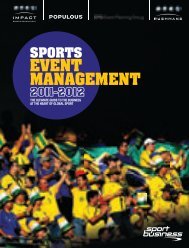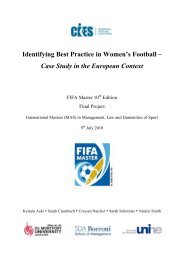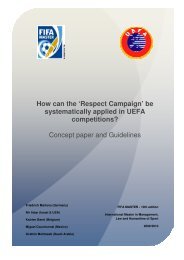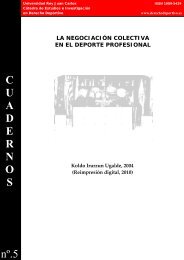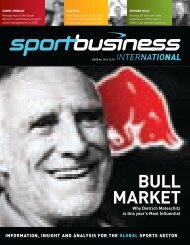01 cover sbi 152.indd - FIFA/CIES International University Network
01 cover sbi 152.indd - FIFA/CIES International University Network
01 cover sbi 152.indd - FIFA/CIES International University Network
You also want an ePaper? Increase the reach of your titles
YUMPU automatically turns print PDFs into web optimized ePapers that Google loves.
NAMING RIGHTS<br />
CORNERSTONE SPONSORS<br />
The O2 is a successful example Getty Images Sport<br />
Staples Center that it’s hard to see either side<br />
wanting to end the partnership. For Staples, the<br />
deal represents an onsite audience of 4 million<br />
people a year - not to mention huge swathes of<br />
media <strong>cover</strong>age. Meanwhile for AEG (the arena’s<br />
rights holders), the deal represents steady<br />
income, support via the Staples retail chain<br />
and, tellingly, a brand which is now inextricably<br />
associated with the golden era of LA Lakers.<br />
This last point harks back to something<br />
Watkins said earlier, with regard to European<br />
stadia. While the sponsoring brand may want<br />
to become deeply embedded in the fabric of<br />
a stadium, does that necessarily serve the<br />
long-term interests of the rights holder What<br />
happens if the venue owner wants to replace the<br />
incumbent - only to find that new partners are<br />
concerned about the background noise created<br />
by its predecessor. Who, after all, would want<br />
to try and rename Bolton Wanderers’ Reebok<br />
Stadium Or the Staples Center<br />
A new direction<br />
Just how significant an issue this is should<br />
become clearer once Etihad Airways beds in as<br />
naming rights replacement at the AFL Telstra<br />
Dome. Venue boss Ian Collins expects the new<br />
name “to become part of Melbourne’s sporting<br />
vernacular” quite quickly. But brands should<br />
watch and learn.<br />
Conflict with previous sponsors is not the only<br />
consideration for naming rights partners. There’s<br />
also the issue of how to juxtapose the needs of the<br />
naming rights partner with those of other existing<br />
partners. This is true in motorsports - where the<br />
diverse array of team, driver and event sponsors<br />
may be one explanation for the lack of circuit<br />
naming rights deals.<br />
It’s also an issue in soccer, where big clubs<br />
like Manchester United have shirts sponsors,<br />
official suppliers and, increasingly, partners with<br />
sets of geographic rights. Partly, the answer is<br />
to have clearly defined contracts, says Watkins.<br />
But this is another example of a situation where<br />
an effective working relationship will also help:<br />
“When you are looking at a 10-20 year contract,<br />
it’s inevitable the venue rights holders will find<br />
new ways to commercialise its facility,” says<br />
Watkins. “That’s reasonable - but it has to be<br />
done in a way that doesn’t impact adversely on<br />
the naming rights partner.”<br />
Still, for all the potential pitfalls, the general<br />
view is that naming rights is set for another<br />
surge. Moore sees potential in France and Italy,<br />
where stadia investment is needed to prepare<br />
both countries for hosting big events.<br />
The same would be true for England if it<br />
hosts the 2<strong>01</strong>8 World Cup. Further afield, there<br />
are opportunities in developing markets which<br />
have hosted, or will soon host, major events.<br />
China’s National Stadium (The Bird’s Nest)<br />
and South Africa’s Cape Town Stadium are<br />
just two of the venues looking for big brand<br />
involvement. In the case of the former, there<br />
have been reports in the Chinese media that the<br />
venue management is looking for as many as<br />
14 partners in the form of naming rights deals,<br />
partnership sponsors and suppliers.<br />
With the Chinese economy already bouncing<br />
back from the downturn, perhaps this is where<br />
we’ll start to see the first shoots of re<strong>cover</strong>y in<br />
the naming rights marketplace.<br />
Barry Wilner on a new naming rights<br />
trend emerging in the US.<br />
MORE THAN HALF A YEAR before the new<br />
$1.3 billion stadium opens in the New Jersey<br />
Meadowlands, the future home of the NFL’s<br />
Giants and Jets has four cornerstone sponsors<br />
in place. That was achieved even before naming<br />
rights were sold.<br />
Well, not precisely, because in 2008, those<br />
naming rights were about to be purchased by<br />
Allianz for approximately $30 million annually<br />
before the teams broke off negotiations.<br />
So while the Giants and Jets have proceeded<br />
slowly and carefully in that area, they had<br />
no delays in lining up the four cornerstone<br />
partners: Verizon, Pepsico, Bud and MetLife.<br />
Each of those companies will pay more<br />
than $6 million a year to have branding inside<br />
the building and on the stadium’s facade, plus<br />
signage in the concourses.<br />
“In what is a challenging time economically,<br />
the fact that we have attracted four major<br />
corporate sponsors for the stadium is<br />
significant,” said Mark Lamping, president and<br />
chief executive officer of New Meadowlands<br />
Stadium Co.<br />
In addition, the Giants previously announced<br />
a 15-year agreement with Timex for the naming<br />
rights to their training facility and corporate<br />
headquarters located within walking distance<br />
of the new stadium. That deal is worth about $3<br />
million annually.<br />
Does all of this mean that smaller<br />
partnerships with sponsors will become<br />
the norm for US stadium deals The Dallas<br />
Cowboys opened their billion-dollar palace<br />
in Arlington, Texas, without awarding naming<br />
rights, but with a collection of sponsorships on<br />
a lesser scale.<br />
“The Jets and the Giants will be playing in<br />
this facility for a long, long time,” Lamping said.<br />
“You can’t force the economics of the deal in<br />
year one or year two simply because the market<br />
may not be where it needs to be.”<br />
When Yankee Stadium opened in the spring,<br />
baseball’s most famous franchise kept the<br />
iconic name and opted instead for agreements<br />
similar to the cornerstone partnerships in the<br />
Meadowlands. The new Yankee Stadium has<br />
deals with Audi, Budweiser, Delta, H&R Block,<br />
Jim Beam, Ketel One and Mohegan Sun for<br />
such things as clubs and suites.<br />
One NFL team owner whose stadium does<br />
not have a naming rights deal, believes a trend<br />
is being set. Speaking anonymously because<br />
“I don’t want to damage any opportunities with<br />
anyone,” he added: “In this economy, there<br />
are so many large corporations - Fortune<br />
500 companies - who simply can’t make the<br />
investment or are fearful of the repercussions<br />
publicity-wise if they sink millions of dollars into<br />
naming rights.<br />
“Plus, you won’t see any automakers or<br />
airlines doing it the way they once did. Instead,<br />
they are willing to spend less for a smaller<br />
presence, perhaps with the idea that later<br />
on, when the economy is stronger and their<br />
businesses are on more solid ground, they can<br />
move up to full naming rights.”<br />
32 SportBusiness <strong>International</strong> • No. 152 • 12.09


